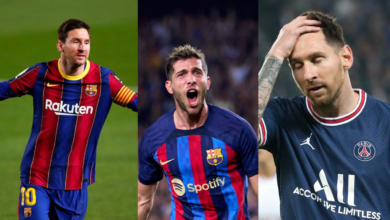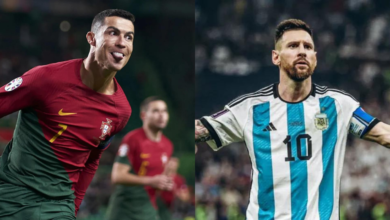
Barcelona were the most dominant Spanish team of the ’90s, but the turn of the millennium brought different fortunes. After winning La Liga in 1999, Barcelona went five seasons without a major trophy. The drought ended under Frank Rijkaard in 2004/05, and he has to be credited with giving consistent first-team opportunities for the likes of Messi and Iniesta. By the end of the decade, Barcelona was firmly a football superpower and were playing some of the best football ever seen. In this article, we will take a look at the greatest Barcelona XI of the 2000s.
Selection criteria:- A minimum of 100 games from 2000/01 to 2009/10.
Honourable mentions:- Frank de Boer, Phillip Cocu, Patrick Kluivert.
Goalkeeper – Victor Valdes
A La Masia product, Valdes has won the Zamora trophy a record five times. Valdes made his senior Barcelona debut during the 2002/03 season and was his club’s first-choice goalkeeper for the rest of the decade. He also famously went 466 minutes without conceding a goal in Europe, a club record.
Defenders – Dani Alves, Rafael Marquez, Carles Puyol, Giovanni van Bronckhorst.
Dani Alves joined Barcelona only in 2008 but made an immediate impact. He was seen by many as an adventurous option down the right, but he showed his defensive prowess under Guardiola. The left-back spot in the greatest Barcelona XI of the 2000s goes to Giovanni van Bronckhorst. He was also effective in attack and scored four goals in the title-winning 2004/05 season.
Marquez and Puyol form the centre-back pairing in the greatest Barcelona XI of the 2000s. Marquez joined Barcelona from Monaco in the summer of 2003. He spent seven successful seasons at the club, winning all the major trophies. Marquez was also deployed as a midfielder at times due to his elegant ball-playing ability. A true warrior, Puyol was a born leader who commanded utter respect on and off the pitch with his attitude. He made his first-team debut in 1999 and retired as a one-club man in 2014.
Midfielders: Xavi, Deco, Iniesta.
No player symbolized Barcelona’s tiki-taka approach better than Xavi. Despite his obvious quality, Xavi did not quite reach his zenith until Frank Rijkaard took over. In the late 2000s, he was a level above any other midfielder as he completely dictated a game’s tempo.
Deco’s signing from Porto confused Barcelona fans, as the club already had many attacking midfielders. But he adapted beautifully as a hard-working and deep-lying playmaker. He spent four highly successful seasons at the club before departing for Chelsea in 2008.
While Xavi controlled the game, Iniesta often proved to be the point of difference. He possessed exquisite ball control and the ability to beat defenders in tight spaces. He also had a knack of scoring world-class goals just when his team needed him the most.
Forwards: Ronaldinho, Eto’o, Messi.
Ronaldinho was a pure entertainer who also just happened to score a lot of goals for Barcelona. His signing in 2003 changed the fortunes of the club, and soon they were back among Europe’s elite. He won the Ballon d’Or in 2005, mainly for helping Barcelona to the League title by scoring 17 goals.
Eto’o was a Real Madrid reject when he joined Barcelona and a certified legend when he left Camp Nou in 2009. Eto’o scored in the 2006 and 2009 Champions League final, guiding Barcelona to victory. In his last season, he scored 30 goals in the league and left after securing a continental treble.
Messi made his senior career debut in 2003, but it took him a few seasons to become a starter. Once he got consistent opportunities, he was simply unstoppable. For Barcelona, the first decade of the twenty-first century ended with the fact that arguably the greatest player ever is in their ranks.




